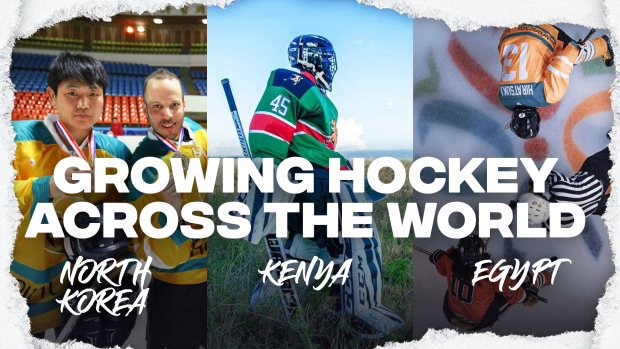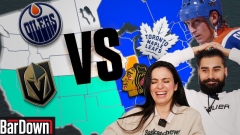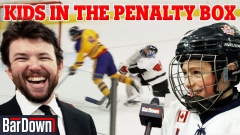In Canada, hockey lives in the forefront. Love for the game burns hot in the heart of Canadian identity, and it courses powerfully through the veins of Canadian culture. For many, hockey is a centerpiece of what it means to be Canadian, and you’ll be hard-pressed to find another country that carries the same level of pride towards a particular sport.
Yet even in Canada, along with other hockey-loving nations, the sport is notoriously difficult to get into. The high-cost of equipment is enough to deter lots of parents from putting their kids into hockey, while the cost of travel and league fees represent additional obstacles.
Train your attention to warmer countries, poorer countries, or politically-different countries, and there are a whole new set of obstacles. Facilities are non-existent or, at the very least, difficult to maintain. Access to resources such as equipment and coaching are difficult to attain. As a result, the interest level remains low.
Insurmountably high barriers are understandably daunting, however the opportunity to chip away at them in a positive way can also be extremely rewarding.
For content creator and recreational hockey player Alex Frecon, that opportunity unexpectedly presented itself in one simple Reddit post with a title too tantalizing to scroll past.
“Who wants to come to North Korea to play hockey with me?”
*Click.*
Alex was redirected to Howe International Friendship League’s website, where he unknowingly discovered an organization that would become a cornerstone of his life.
At the time, Friendship League founder and CEO Scott Howe was looking for hockey players willing to go on a trip to North Korea with an ultimate goal of bringing the Special Olympics to the notoriously closed-off nation. Alex admits that this apparent opportunity to play against the North Korean national hockey team didn’t quite reel him in at first.
“I found it to be so beyond my scope of absurd things that I’d ever possibly entertain, that I just immediately clicked out of it.” Alex says in an interview with BarDown. “But it planted a seed that grew.”
Alex is a content creator for COOL STORY, a content agency he formed that “operates at the intersection of advertising and entertainment.” No stranger to out-of-the-box ideas, a chance to make content in North Korea became too enticing pass on.
It took a back-and-forth of approximately 75 emails with Scott until Alex finally committed to the trip. The adventure remained such a question mark that he decided to not even tell his parents about the true destination.
However, in the end, Alex was pleasantly surprised by a realization that would become a bolstered theme throughout his time with the Friendship League – people aren’t what you think they’ll be, and they’re usually better.
In his documentary-style vlog entitled ‘I went to North Korea to play hockey (No, seriously)’, Alex brings us along for his transcendent journey through the world’s most secretive place. He begins the video with a point blank acknowledgement that his experience in North Korea is not an accurate depiction of the country’s past or present, but what he is able to capture is impactful in itself; human nature.
“Human beings are far more alike than they are different,” Alex muses. “When you find some common ground, people are really eager to get along with each other. I always try to present that in a lot of my content.”
North Korea was a clear example of how expectation doesn’t always become reality. Throughout the video, Alex communicates his surprise at how friendly and fun-loving the Korean hockey players were, clearly identifying a human nature element into the central message.
“Ever since I went to North Korea with the Friendship League, I now view the world kind of like it’s a big pie,” Alex explains with his hands outstretched as though holding an actual pie. “Human beings are trying to decide how much to carve out of that pie, and everyone wants a little bit more than the other person. To see that dynamic has been pretty eye-opening, and if anything it’s made me appreciate actual people – like human beings – more.”
The trip to North Korea had a specific goal; try to bring the Special Olympics to a country that doesn’t usually acknowledge intellectual disabilities. While this was a mission totally surrounded with question marks, it was one that proved to be fruitful in the end.
“The impact [the Friendship League] was able to have with intellectual disabilities in North Korea is pretty profound. I can’t speak to it as accurately as Scott, but from my understanding [intellectual disabilities were] not something that was openly discussed or acknowledged. Through the Friendship League, that fundamentally changed where now there are actual programs. I mean, that is supremely impressive stuff.”
Fast forward a few of years and North Korea is now just one notch on Alex’s growing list of trips with the Friendship League. He’s now been on five trips with the organization, including a couple more hockey-centric trips with video accompaniment to Kenya and Egypt.
With ultimate goals of building communities and growing the sport of hockey through goodwill, there may be no greater triumph for the Friendship League than their trip to Kenya.
The Kenyan national hockey team – the Kenya Ice Lions – have become a central figure in the globalization of hockey. If you’ve been tuned into the hockey world for a while, you would likely recognize their now-iconic jerseys, and perhaps you’ve even seen some other content around them.
The Friendship League couldn’t have picked a better destination. According to Alex, the Kenyan people were thrilled to welcome the organization and sport into their country. The whole event became somewhat of a spectacle that balanced curiosity with an eagerness to participate.
“Everyone we interacted with was so passionate about the game of hockey. That was so cool to me.” Alex explains.
One particular journey stood out to Alex, and that was a girl that had walked more than an hour and a half simply to watch and play hockey with the Friendship League.
“That girl, she walked 90 minutes because she loves hockey and loved the idea of getting to play with people. All the Kenyan players would talk about the lengths they would go through. They weren’t complaining! For them, it was just a joy to play the game. It’s good to experience stuff like that.”
In the big picture, an hour and a half walk is a small obstacle compared to most obstacles facing warm-weather countries. Alex lists three main bullet points that make it so difficult for the Friendship League and other entities to grow hockey in these climates; interest, equipment, and facilities.
Interest
“The first hurdle is understanding why it’s important,” Alex says about countries accepting the Friendship League. “Egypt, that was a big part of that tournament. Something a lot of the participants weren’t aware of behind the scenes was getting the Egyptian government to realize ‘this sport is cool, it has promise, [and it’s] worth investing in’ – just generating interest.”
Facilities
“Running and maintaining an ice rink requires money, but it also requires a certain skill set that is not predominant in the middle of a desert, or in Kenya for example.” Alex says.
While ice itself may be a rarity in destination choices of the Friendship League, Alex recalls his experience in Kenya to prove that it’s possible to grow hockey in other ways. He discusses the value of YouTube, including the example of one player who is self-taught from watching guys like Connor McDavid and Nathan MacKinnon through the platform. Additionally, the team found a more manageable way to play...
“Finding ice is really challenging, but the Kenyan team works around that by playing a lot of roller hockey.”
Equipment
“Sourcing equipment is probably the third biggest obstacle,” Alex says. “I remember in Kenya it was really awesome to see how the kids were makeshift fixing up their gear, the lengths that they were going to get longevity out of their equipment. But it was also kind of sad too, because it’s like ‘damn, I wish I could just ship you 100 wooden Sherwood sticks’ or something like that.
“The cost of the game is high, and equipment is expensive.”
Beyond these three obstacles, there is another murkier obstacle.
Understandably, the nature of these events can come with an array of agendas, and sometimes it can be difficult to find a balance that works for everyone. In a dream scenario, everyone involved would have their priorities and goals aligned – building communities and growing the game through goodwill.
In Alex's opinion, the event in Cairo was a little more tense than he had experienced at other global hockey events.
“It was so strange.” Alex begins, speaking about his experience playing in front of foreign dignitaries in the food court of a mall in Cairo.
“It was so bizarre. Don't get me wrong, it was also kind of fun too - it was definitely cool to see so much hype around the event, but on the other hand, it wasn't something that the Friendship League had total control over, you know? It made you wonder where the hype was coming from."
For event organizers, the challenges are equally high. Simply developing enough interest for the game can be difficult, and it requires a lot of hard work from a lot of dedicated people. Funds don't come easily in a country that is so far removed from even just the climate of a hockey arena, and furthermore the cultural differences and the willingness for countries to invest prove to be tall tasks as well.
Overall, the challenges are steep for all those involved. One thing that can be agreed upon by all -- whether it be the Friendship League, the Egyptian Hockey Team, or the organizers of the event -- it's that the players just want to play.
Regardless of the challenges, some of which may never be clearly defined, the Friendship League tries to maintain their mission throughout.
“I was always attached to, and continue to be attached to, the Friendship League agenda which was promoting the sport of hockey and building goodwill around it,” Alex says.
He clarifies that it’s human nature to have everyone trying to find ways in which to benefit themselves. And on the flip side, human nature is also what makes the Friendship League so special.
“In the 5 years I've been involved with the Friendship League, I've always felt really proud of the way they've conducted themselves. Like, they're just objectively not interested in much outside of goodwill. Which is kind of strange to be honest. You're like ‘how can you be this positive?’ But it's just the way that Scott is. It's crazy. And it's also awesome. The world needs more organizations that are motivated solely by bringing people and communities together.”
Alex talks at length about the special friendships that he’s built through bonding with people on these trips. He keeps in touch with these friends through social media, forming bonds that have stood the test of time so far.
Additionally, Alex always feels as though the Friendship League leaves a country with more of a love for the game than when they got there.
“Everywhere we’ve gone, we’ve interacted with people that have never seen the game of hockey before in their lives. And afterwards, they were intrigued and excited about the sport. That’s really cool because you’re creating something with which they can then bond and develop a community.”
Regardless of the obstacles faced, including the possibility of different agendas at times, the experience of watching love for the game grow right in front of his eyes makes the whole thing worth it for Alex and other Friendship Leaguers. In the end, the challenges are worth the rewards.
“It’s cliché, but the game knows no borders. You can find someone that love hockey, or someone can fall in love with the game anywhere in the world.”
The Friendship League plans to go to Ecuador next. While Alex already has a trip with his girlfriend booked and will be unable to go, you may be able to! This could be your “Who wants to come to North Korea to play hockey with me?” moment.
After all, it’s clear how much of a life-changing event that moment can prove to be. Just ask Alex.




